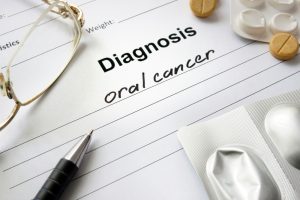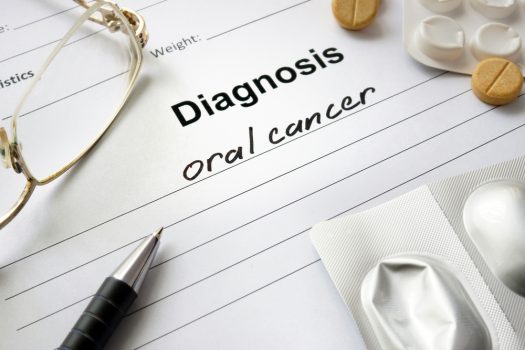Mouth cancer or oral cancer may occur anywhere in the mouth including on the surface of the tongue, the inside of the cheeks, lips, gums, the roof of the mouth, in the tonsils, salivary glands. It commonly occurs after the age of forty with a risk, which is twice higher in men than the women. Oral cancer develops mostly in the tissue of the throat or mouth. It belongs to a broad group of cancers, which are called the head and neck cancers.
Cancer involves an uncontrollable growth of cells, which cause severe damage to its surrounding tissues. Oral cancer is a type of cancer that does not go away, which is a life-threatening disease if not diagnosed and treated early. Early detection is the key to its effective treatment.

Causes
Cancer results when a genetic mutation asks the cells to grow without any control. It starts in one place of the mouth which starts growing slowly and spreads to the other parts of the mouth, leading to the head and neck and ultimately to the rest of the body. Squamous cell carcinoma is the condition when cancer starts in the squamous cells that line the lips and the inside of the mouth.
The specific cause of cancer has still not been discovered, but there are a lot of risk factors and reasons that are considered a chance to give rise to cancer. The mutations allow cancer cells to keep growing and developing till all the healthy cells in the body die. The abnormal cancer cells accumulate in the mouth, which forms a tumor.
See Also: Spotting The Signs Of Oral Cancer
Symptoms
Signs and symptoms of mouth cancer:
- Bleeding sores
- Loose teeth
- Pain in tongue
- A sore throat
- Drastic weight loss
- Difficulty in swallowing and chewing food
- Pain in jaws or stiffness
- Numbness and pain in face/mouth/neck
- Ear pain
- Lump or swelling of the skin in the lining of the mouth
- Poorly fitting dentures
Prevention
There has been no definite discovery of a way to prevent mouth cancer; however, there are specific ways of avoiding it:
- If you are taking tobacco, then stop it altogether. If you have not ever done tobacco, then do not ever start with it. Chewing or smoking tobacco gives way to the cancer-causing cells to affect the cells present in your mouth dangerously.
- Excess alcohol consumption is profoundly unhealthy for the body as it can irritate the cells present in the mouth, which can make them vulnerable to mouth cancer. Limit yourself to the consumption of alcohol.
- Consume lots of fruits and vegetables and take a diet rich in proteins and minerals. The vitamins and oxidants present in them are beneficial in reducing the risk of mouth cancer.
- Avoid being exposed to the sun and protect the skin of your lips from the harmful UV rays by staying in the shade whenever possible. Apply sunscreen products regularly.
- Check up regularly with your dentist and ask for regular examinations to inspect your mouth to detect early symptoms.

Treatments
Various treatments vary on the type, location and the stage of mouth cancer.
- Surgery: This treatment in the early stages usually involves surgery to remove the tumor and the cancer lymph nodes. Along with that, the tissue surrounding the affected area is taken out.
- Radiation therapy: Radiation therapy is another therapy option that involves aiming the radiation beams directly at the tumor one or two times in a day, for at least two to eight weeks. The treatment for advanced stages includes a combination of chemotherapy and also radiation therapy.
- Chemotherapy: A treatment involves drugs, which kills the cancerous cells present in the body. The medicine is injected into the body either orally or through an intravenous (IV) line.
- Targeted therapy: This is another form of treatment, which is useful if treated on early stages as well as advanced stages of cancer. Targeted therapy drugs are given to specific proteins of the cancer cells that interfere and stop the growth of the cells.
Visit a doctor as early as soon as possible, if you witness any symptoms that are related to oral cancers. It will reduce the risk of detecting it at its advanced stages. Most patients detect it late due to delay in consulting the doctor at the right time. Dr. Sam Sadati, a Wellington Dentist, is a specialist who suggests that it is necessary to cautiously deal with symptoms of oral cancer and contact a trusted doctor as soon as one can.

